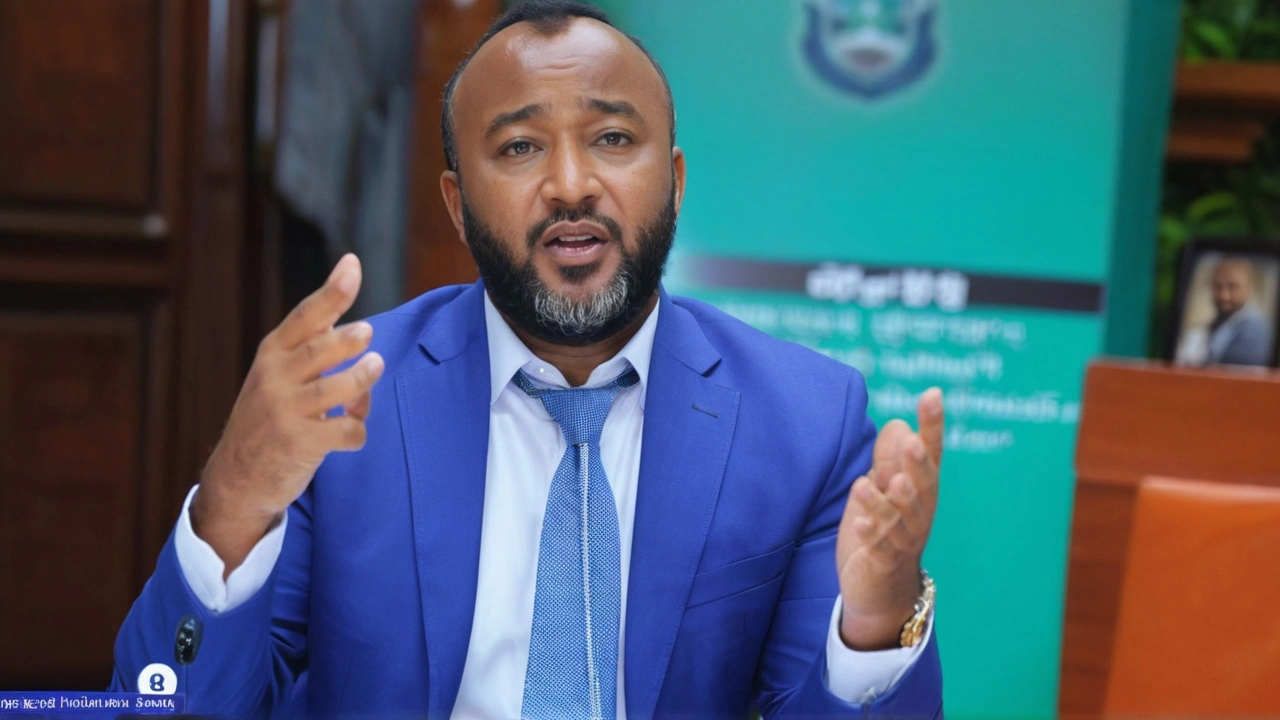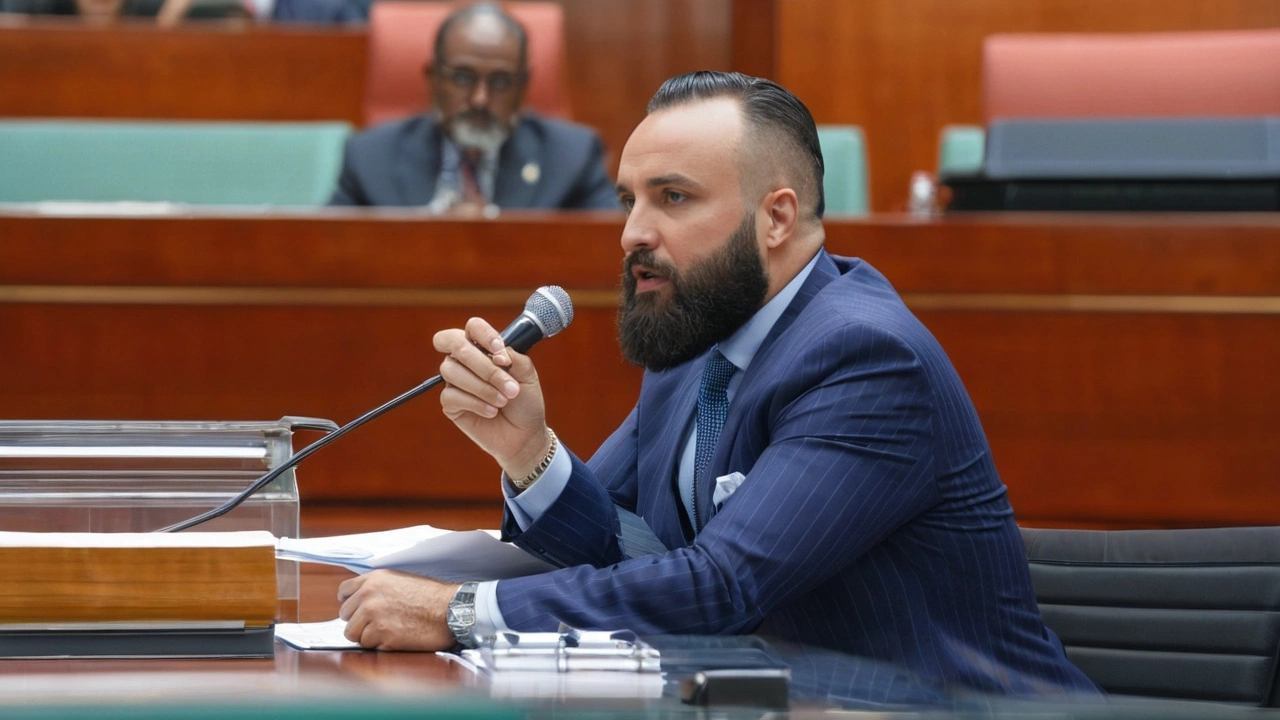Hassan Joho's Vision for the Blue Economy
Mombasa Governor Hassan Joho has outlined an ambitious plan to leverage Kenya's blue economy if he is approved as the Cabinet Secretary for Mining. This announcement comes amid discussions about the country's economic future and the need for diversification beyond traditional sectors. Joho emphasized that the blue economy, which includes a vast array of maritime resources, holds immense potential for driving economic growth and creating job opportunities across the nation.
Joho's commitment to the blue economy is driven by his recognition of the untapped potential within Kenya's maritime sector. The blue economy extends beyond fishing and shipping to include tourism, aquaculture, marine biotechnology, and renewable energy. By focusing on these areas, Joho seeks to create a more resilient economic framework that can withstand global market fluctuations and contribute to sustainable development.
Sustainable Management of Marine Resources
A key aspect of Joho's vision is the sustainable management of marine resources. He highlighted the importance of balancing economic activities with environmental conservation to ensure long-term benefits for coastal communities and the nation at large. Joho stressed that unsustainable exploitation of marine resources could lead to ecological degradation, negatively impacting livelihoods and the environment.
To achieve sustainable management, Joho plans to implement policies that regulate fishing activities, prevent illegal fishing, and protect marine habitats. He also aims to promote environmentally friendly mining practices that minimize harm to coastal ecosystems. By adopting a holistic approach, Joho believes that Kenya can harness the full potential of its blue economy while safeguarding its natural heritage.
Boosting Tourism and Fishing Industries
Tourism is a major component of Joho's strategy to revitalize the blue economy. Coastal regions in Kenya are renowned for their scenic beauty, pristine beaches, and rich cultural heritage. Joho envisions a vibrant tourism industry that attracts both local and international visitors, generating revenue and creating employment opportunities. He believes that by promoting eco-tourism and investing in infrastructure, Kenya can enhance its appeal as a top tourist destination.
In addition to tourism, Joho sees tremendous potential in the fishing industry. Kenya's coastal waters are rich in marine life, offering opportunities for sustainable fishing and aquaculture. Joho plans to support local fishermen by providing them with modern equipment, training, and access to markets. By doing so, he hopes to increase fish production, improve livelihoods, and contribute to food security.

Addressing Environmental Concerns
Environmental concerns are at the forefront of Joho's agenda. He acknowledges that mining activities, if not properly managed, can lead to environmental degradation and pose risks to marine ecosystems. To mitigate these risks, Joho pledges to enforce strict environmental regulations and ensure that mining operations are conducted in an environmentally responsible manner.
Joho's approach includes conducting environmental impact assessments before approving mining projects, monitoring compliance with environmental standards, and implementing measures to rehabilitate affected areas. He believes that a strong regulatory framework is essential to balance economic development with environmental protection.
Collaboration for Success
Joho's vision for the blue economy involves collaboration with various ministries, stakeholders, and international partners. He recognizes that achieving his goals requires a coordinated effort and the pooling of resources and expertise. By working together, Joho believes that Kenya can unlock the full potential of its maritime resources and create a prosperous future for its citizens.
Joho's plan includes strengthening partnerships with the Ministry of Tourism, the Ministry of Environment, and other relevant agencies. He also aims to engage with local communities, private sector players, and non-governmental organizations to ensure inclusive and participatory development. By fostering a collaborative approach, Joho hopes to drive sustainable growth and improve the livelihoods of coastal communities.
Diversifying Kenya's Economic Base
At the core of Joho's vision is the desire to diversify Kenya's economic base. Traditional sectors such as agriculture and manufacturing, while important, are susceptible to external shocks and market fluctuations. Joho believes that by tapping into the blue economy, Kenya can reduce its dependence on these sectors and build a more resilient economy.
Joho's strategy involves identifying and developing new growth areas within the blue economy, such as marine biotechnology and renewable energy. He envisions Kenya becoming a hub for blue innovation, attracting investment, and creating high-quality jobs. By diversifying the economy, Joho aims to ensure long-term stability and prosperity for the nation.

Conclusion
Hassan Joho's commitment to the blue economy represents a strategic move to transform Kenya's economic landscape. His vision encompasses sustainable management of marine resources, boosting tourism and fishing industries, addressing environmental concerns, and fostering collaboration for success. Joho's approach aims to diversify Kenya's economic base, reduce dependency on traditional sectors, and create a more resilient and prosperous future for all citizens.


Comments
Reagan Traphagen
The blue‑economy hype is a front‑page distraction, paving the way for offshore mining syndicates to infiltrate Kenya’s marine zones.
August 4, 2024 at 21:26
mark sweeney
If we define progress as the relentless extraction of value, then Joho’s proposal merely rebrands exploitation as stewardship. He paints marine resources as endless, yet history shows for every "sustainable" venture a hidden cost emerges. By swapping soil for sea, we risk replicating the same colonial patterns under a glossy banner. The narrative sidesteps the deeper power dynamics between local fishers and multinational investors. Ultimately, the promise of jobs may mask a transfer of wealth to foreign hands.
August 5, 2024 at 08:33
randy mcgrath
I get the excitement behind diversifying the economy, but we have to keep an eye on real outcomes. Sustainable fishing and tourism sound great on paper, yet the implementation details matter. If community voices aren’t genuinely part of the decision‑making, the projects could fall short. A balanced approach that measures both ecological health and socioeconomic impact will be key.
August 5, 2024 at 19:40
Frankie Mobley
Kenya’s coast has a lot to offer beyond beaches – think aquaculture, marine biotech, and clean energy from waves. Investing in these sectors can create stable jobs and reduce reliance on agriculture. Simple steps like training local crews and building modest port facilities can kick‑start the blue economy without massive debt.
August 6, 2024 at 06:46
ashli john
Love the vision it’s really inspiring keep pushing forward
August 6, 2024 at 17:53
Kim Chase
Totally agree, and adding community workshops on sustainable practices could bridge the knowledge gap. Simple, low‑cost training often yields the biggest returns for locals.
August 7, 2024 at 05:00
David Werner
Sounds like a corporate PR stunt.
August 7, 2024 at 16:06
Paul KEIL
Joho’s framework leverages synergistic asset allocation across marine biotech, renewable wave power, and eco‑tourism to catalyze macro‑economic resilience whilst mitigating fiduciary risk exposure.
August 8, 2024 at 03:13
Horace Wormely
Just a quick note: “rebrands” should be “re‑brands” and “emergence” is better as “emerges.” Also, “colonial” needs a capital C when referring to the historical period.
August 8, 2024 at 14:20
christine mae cotejo
The concept of a blue economy isn’t new, yet its successful implementation requires a tapestry of interwoven strategies that respect both nature and human livelihoods. First, a robust legal framework must delineate exclusive economic zones, fishing quotas, and mining rights with crystal‑clear enforcement mechanisms. Second, investment in scientific research is essential; without baseline data on marine biodiversity, any development risks unintended collapse of ecosystems. Third, empowering coastal communities through equity‑based ownership models ensures that profits stay local rather than draining offshore. Fourth, partnerships with international NGOs can bring best‑practice guidelines and access to green financing. Fifth, integrating renewable energy-such as offshore wind or tidal generators-can reduce reliance on fossil fuels and power coastal industries sustainably. Sixth, a transparent licensing process mitigates corruption and builds public trust, especially when civil society monitors compliance. Seventh, education programs in schools and vocational centers will cultivate a generation of skilled workers versed in marine technology. Eighth, infrastructure upgrades, like modernized ports and cold‑storage facilities, boost the competitiveness of fish products in global markets. Ninth, marketing Kenya’s unique marine heritage can attract eco‑tourists who value authentic experiences over mass‑tourism. Tenth, regular environmental impact assessments must be mandated before any project proceeds, with remedial actions enforced rigorously. Eleventh, a disaster‑response unit prepared for oil spills or illegal dumping protects both the environment and the economy. Twelfth, data‑driven policy adjustments allow the government to react swiftly to overfishing signals or climate‑induced shifts. Thirteenth, encouraging private sector innovation through tax incentives spurs the development of new aquaculture techniques. Fourteenth, aligning the blue economy agenda with the United Nations Sustainable Development Goals creates a narrative that resonates with global investors. Finally, continuous dialogue among ministries, local leaders, and the private sector ensures that the blue economy remains a shared vision rather than a top‑down decree.
August 9, 2024 at 01:26
Douglas Gnesda
Great breakdown! Adding to that, Kenya could pilot a joint research vessel staffed by both local scientists and international experts to gather the baseline data you mentioned.
August 9, 2024 at 12:33
Abhijit Pimpale
Policy without enforcement is meaningless.
August 9, 2024 at 23:40
Eric DE FONDAUMIERE
Let’s get those sustainable nets rolling!
August 10, 2024 at 10:46
Pauline Herrin
While the terminology is impressive, the practical steps behind “synergistic asset allocation” need clarification. Investors will want specific metrics rather than buzzwords.
August 10, 2024 at 21:53
pradeep kumar
Enthusiasm is vital, but realistic timelines prevent disappointment when projects stall.
August 11, 2024 at 09:00